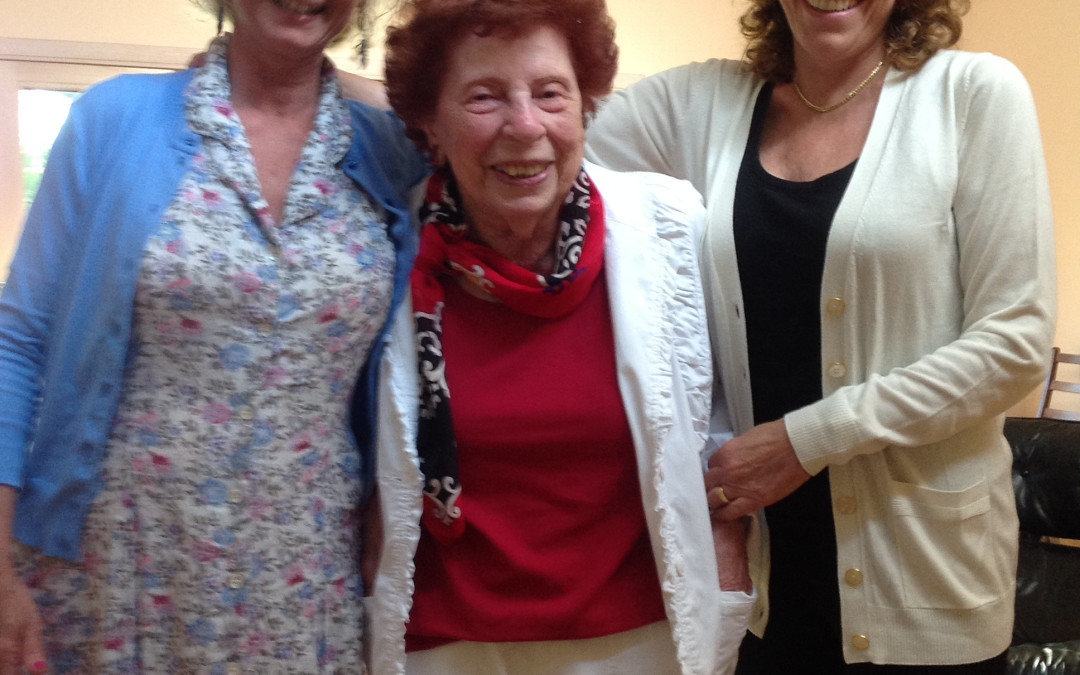
‘If you don’t give her antibiotics, she’ll go toxic and die.”
Although my 96 year old aunt (pictured at left, between me and my cousin – her daughter) had no symptoms of a bladder infection, a urine test resulting from cloudy pee revealed she indeed had a Urinary Tract Infection (UTI. My aunt hadn’t complained about pain or discomfort, my cousin – her ‘power of attorney’ – authorized treatment with antibiotics. Many would agree.
However, when I shared this with Dr. Jocelyn Charles, Chief of the Department of Family & Community. Medicine and Medical Director of the Veterans Centre at Sunnybrook Health Center, she shook her head. “Treating the test results and not the patient.”
The (assuredly well-meaning) healthcare professional who made that pronouncement was talking about ‘sepsis’: when the bloodstream – and therefore the whole body – has become one big infection it becomes ‘toxic.’ In a younger person, antibiotics – standard protocol – would be a no-brainer. Rarely it seems, is taken into account the repercussions of ‘standard protocal’ in the elderly.
Functionality and age should have an impact on treatment decisions
From the blog, Geripal – devoted to optimal treatment of the elderly: Survival from severe sepsis: yes the infection is cured but not all is well – the point is made that, in the elderly – unlike those younger, whose bodies have more resources – treatment does not equal ‘back to how she was before’. Instead, treatment that sounds so necessary and logical can lead to increased confusion, worsening dementia, and a more vulnerable immune system.
In my aunt’s case, several courses of antibiotics failed. A urinary stent was recommended: a tube, inserted under general anaesthetic, from kidney to peeing-tract. This has to be replaced every 6 months, every time the ‘general’ takes away a bit more my aunt’s ‘self’.
Comments on the GeriPal blog reveal the disconnect between well-meaning medical professionals, and the reality of life after procedure:
Most medical healthcare professionals only fixed the infection sepsis and after recovery, discharged the patient. Then left the family to care and worry for the recovered family member, to cope with reduced ADL (Activities of Daily Living). When approached the follow up doctors, they said patient is elderly so is like this after a sepsis.
Antibiotics and treating infections, from the blog, Pallimed, which is devoted to the palliative philosophy – which focuses on comfort care, this comment:
I came across this blog post while trying to find out how common it is to give antibiotics to very elderly people. My mother is ninety four. She has been gradually over the last year becoming more and more confused. With this last infection she really has lost cognitive function, she is unable to speak or express herself. She cannot say where she hurts or what she wants and she sees and hears things. She is currently in hospital on an I.V. drip which does not seem to be doing much to improve things. Not using the antibiotics was never discussed with me. I am beginning to wonder what exactly it is we are prolonging here? Her life? Or her death. She seems utterly miserable to me. She no longer eats except for a few sips of liquid a day. The doctors and nurses seem so intent on continuing this course. If I believed for one second as I once did that she would recover and go back to being able to carry on conversation, to be independent, to be as she would wish to be, then I would have full faith in what we are doing.
I feel the doctor is simply following some protocols that are ‘routine’ I am put off to bring up the issue. When oh when, is it time to make her comfortable and to not keep on with this? This is one of multiple infections over the last few years. This is the worst of them all as she has lost all ability to communicate and after four and half days of strong antibiotics on an I.V. drip, no improvement. Her lungs were beginning to fill up due to the fluids given to her for dehydration, her kidneys were not putting out the level of fluids they should. More drugs are being given to try to keep the fluid off her lungs, while trying to keep her hydrated.
There is nothing left that she can enjoy in any of her waking moments now. Maybe, she will get better physically for a time but, it seems it will be expected that she is to live without knowledge of her surroundings only to end up being back at this place soon in the future. I am so torn. I do not know if we are making her better or making her suffer more in our selfishness to see her life continue no matter in what form?
Thank you for delving into this subject a bit…options are given for a D.N.R. and she has one..and I was asked what we should do if her blood pressure suddenly dropped and I said she did not want extraordinary measures…but, what ARE we doing now?? Is this a sane, and compassionate thing to do to a ninety four year old woman who would be mortified to not be able to be in control of her own life and care?? She was a nurse btw.. I know this is not somehow the right thing and yet because it’s ‘only’ antibiotics, I do not feel right stopping it unless it is an option families and patients are given! They seem so intent to do this…I am so unsure this is the right thing at this point.”
Certainly decisions of these sorts are never easy, and often there’s no ‘one’ right answer. But it can be helpful to have more context and to be able to think things through on a ‘what if’ basis long before the crises is upon you.
©Kathy Kastner

Dear Kathy,
Thank you for this blog. My dad is 90, has an UTI, has lost almost all body mobility, his mind is rarely here, and suffers loads of pain when cleaning or moving in any way.
You described very well the situation, and it is not easy for family to decide really what is best course of action. You want to do everything you can for your loved one. But what is the best?
We need more education and more discussions on this topic.
While going through this some times I think that trying to keep alive someone who is suffering, has no chances of being himself is a form of torture, but what is the best way to comfort your beloved one?
I wish you and your loved ones well.
Ana R.
excellent put up, very informative. I’m wondering why the other specialists of this sector do not understand this.
You must continue your writing. I’m confident, you have a great readers’ base already!
My nan is 91 years old ,been bed bound in a care home for over a year, no visits from any family through civic only talknon phone, currently has a UTI been on antibiotics for over a week, and still in pain ,not eating,sipping water. Not talking to us on phone ,, sleeping all the time. Doctor now put on more antibiotics, and said it’s ok not eating, she has dementia, it’s very upsetting as we can’t see her, if they are doing the right thing for her, as we are not aloud to see her, she says she just wants to die, surely we should be able to see her its wrong, what should we do .
Thoughts are with you..in same situation in NZ..we can vist her.
Have decided to stop all antibiotics and increase pain meds..it is a hard decision but it is down too quality of life not quantity..there lives in this world is over as they want it.
God bless
Very helpful and informative. Thank you for sharing this post.
My mother in NZ turned 91 in hospital with a UTI we have decided to not continue antibiotics as she had a stroke a month ago has dementia and we had no choice but put in care and with a covid scare couldn’t vist her.
She went down hill and ended up where she is today.
With palliative care we have made sure she is in no pain but leaving this world is on day 5 and so hard to see.
It is all about quality of life not quantity she is a world war 2 ophan survivor and has no siblings left ..it is her time to join them her time here on earth is done.